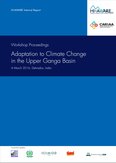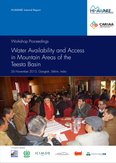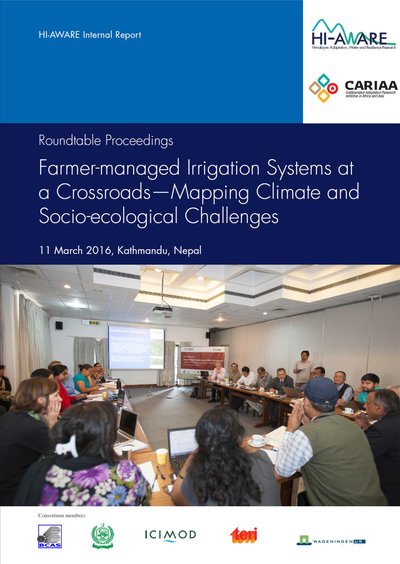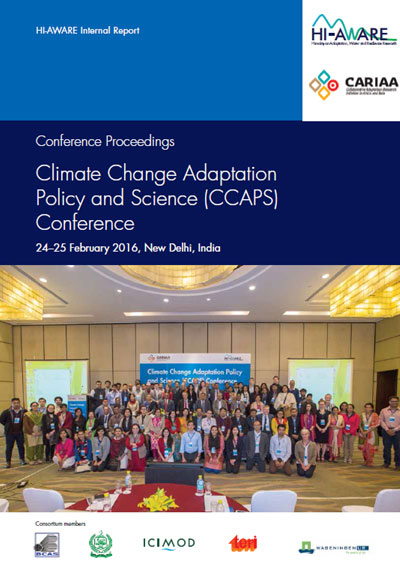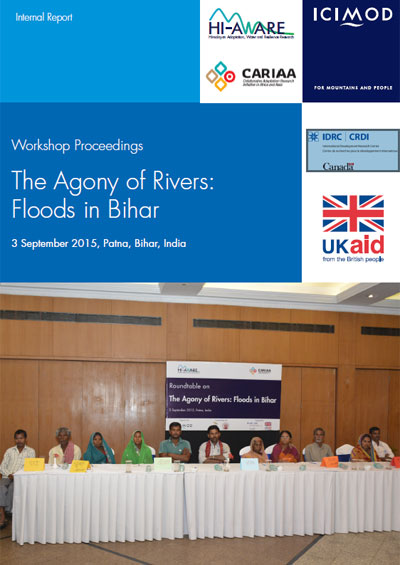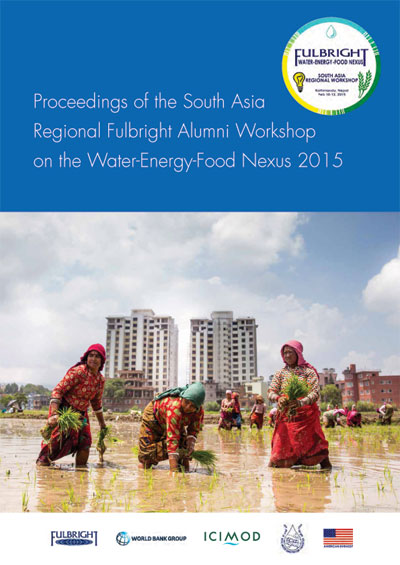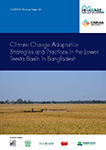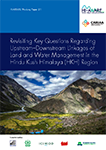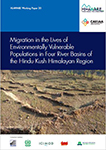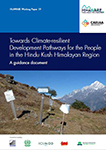Workshop Proceedings: Adaptation to Climate Change in the Upper Ganga Basin
Workshop Proceedings , 2016
The workshop on ‘Climate Change in the Upper Ganga Basin’, was held between 27th February-4th March, 2016. It was aimed at understanding the challenges that communities face in this challenging terrain.The workshop brought experts from various sectors together to share valuable information on the climatic risks that the region—the Western Himalayas in general, and Uttarakhand in particular—is facing.
Workshop Proceedings: Water Availability and Access in Mountain Areas of the Teesta Basin
Workshop Proceedings , 2016
The Energy and Resources Institute (TERI), New Delhi, along with The Mountain Institute (TMI India), Gangtok, Sikkim organised a workshop on Water Availability and Access in Mountain Areas of the Teesta Basin under the Himalayan Adaptation, Water and Resilience (HI-AWARE) Research project on 26 November 2015. The workshop aimed to understand issues regarding water in the Teesta Basin from the perspectives of different stakeholders, identify response actions and their challenges and opportunities for implementation.
Workshop proceedings on Farmer Managed Irrigation Systems
Workshop Proceedings , 2016
FMIS(Farmer Managed Irrigation Systems) have survived decades of changes, they are likely to possess characteristics of a resilient system. However, a system level assessment of FMIS is necessary in order to understand the diverse causal factors leading to its decline.
Conference Proceedings Climate Change Adaptation Policy and Science (CCAPS)
Workshop Proceedings , 2016
The Climate Change Adaptation Policy and Science (CCAPS) Conference held in New Delhi, India, from 24-25 February 2016 brought together over 100 participants—HI-AWARE consortium members, partners, scientists, student researchers, and government and donor representatives—to discuss the reality of climate change and other changes taking place in the Indus, Brahmaputra and Ganges river basins. The conference was organised by Himalayan Adaptation, Water and Resilience (HI-AWARE) Research, and Collaborative Adaptation Research Initiative in Africa and Asia (CARIAA).
Workshop Proceedings of the Rountable on “The Agony of Rivers: Floods in Bihar”
Workshop Proceedings , 2015
The HI-AWARE Initiative, in collaboration with Megh Pyne Abhiyan (MPA) and the Centre for Environmental Sciences of the Central University of South Bihar (CUSB), organised a roundtable on “The Agony of Rivers: Floods in Bihar” in Patna, India on 3 September 2015. Some 144 participants attended the roundtable at which people from five flood-affected districts of North Bihar – Supaul, Saharsa, Khagaria, Madhubani and Pashchim Champaran – shared their experiences of living with floods, including the impacts of floods on their lives and livelihoods. Experts at the round table, including high level policymakers from the Bihar government, deliberated on the issues flagged to find ways to address them.
Proceedings of the South Asia Regional Fulbright Alumni Workshop on the Water-Energy-Food Nexus 2015
Workshop Proceedings, 2015
The publication entitled “Proceedings of the South Asia Regional Fulbright Alumni Workshop on the Water-Energy-Food Nexus 2015” is an output of the workshop convened in Kathmandu from 10–12 February 2015. The workshop assembled 60 South Asian alumni of the Fulbright, Humphrey, and International Visitors Leadership programmes, along with 40 regional and international experts, to promote a shared understanding of water, energy, and food issues in the region.
Climate Change Adaptation Strategies and Practices in the Lower Teesta Basin in Bangladesh
Working Paper - 22, 2018
This study aims to deepen our understanding about local climate change trends, adaptation approaches and strategies of the government, NGOs, and other actors, and emerging adaptation practices in key impacted sectors in the Lower Teesta basin in Bangladesh. This region, regarded as one of the important food baskets of the country, has been experiencing varied changes in climate variability (including temperature rises, heat stress, low and erratic rainfall, and prolonged droughts), falling groundwater levels, and climatic extremes such as frequent and devastating floods, riverbank erosion, and thunderstorms. These climate change and other stressors are hurting sectors such as agriculture, water, sanitation and health, fisheries, food security, regional infrastructure, housing, and the livelihoods of common people in general.
Revisiting Key Questions Regarding Upstream–downstream Linkages of Land and Water Management in the HKH Region
Working Paper - 21, 2018
The activities and processes led by natural and anthropogenic factors not only change environmental variables upstream (such as land use and land cover, snowmelt, and erosion, among others), they also affect the downstream environment in terms of water availability, floods, and sedimentation. Upstream–downstream linkages (UDL) of land and water management in the Himalayan region have been widely discussed in the literature. In 1989, L. A. Bruijnzeel and C. N. Bremmer published an ICIMOD occasional paper highlighting highland–lowland interactions in the Ganges–Brahmaputra river basins (Bruijnzeel & Bremmer 1989).
Migration in the Lives of Environmentally Vulnerable Populations in Four River Basins of the Hindu Kush Himalayan Region
Working Paper - 20, 2018
This study examines the patterns of migration, and its role in building adaptive capacities of households in four river basins – the Indus, the Upper Ganga, the Gandaki, and the Teesta – of the Hindu Kush Himalayan (HKH) region. The HKH region is one of the more environmentally vulnerable areas in the world.
Towards Climate-resilient Development Pathways for the People in the Hindu Kush Himalayan Region: A guidance document
Working Paper - 19, 2018
Development is occurring against a backdrop of vulnerability to climate change. In order for development decisions to be sustainable in a changing climate they need to include choices and actions that modify climate change and its impacts and sustain development efforts over time. In the context of adaptation to climate change, adaptation pathways are proposed as a promising decision-focused approach to incorporate flexibility and account for future uncertainties (e.g. Haasnoot et al., 2013, Wise et al., 2014, Bosomworth et al., 2017).

